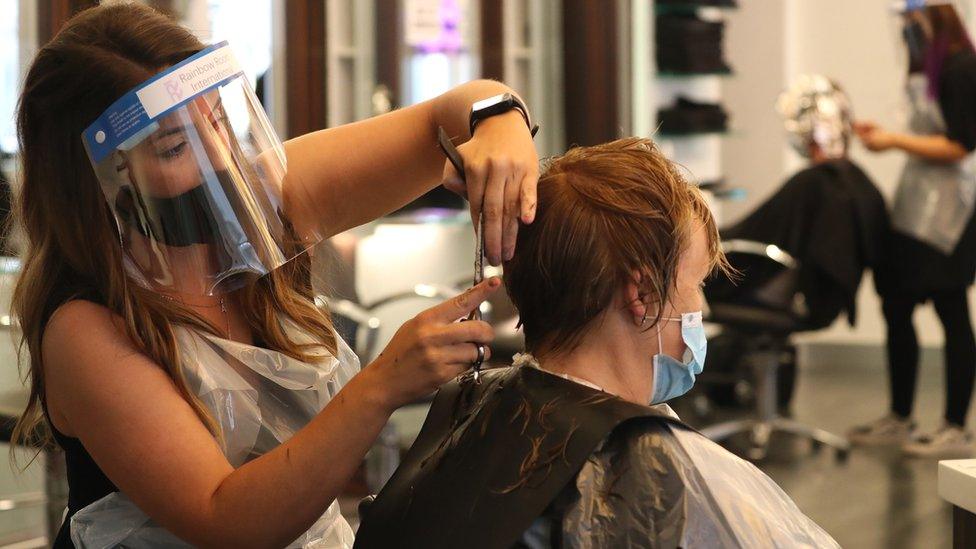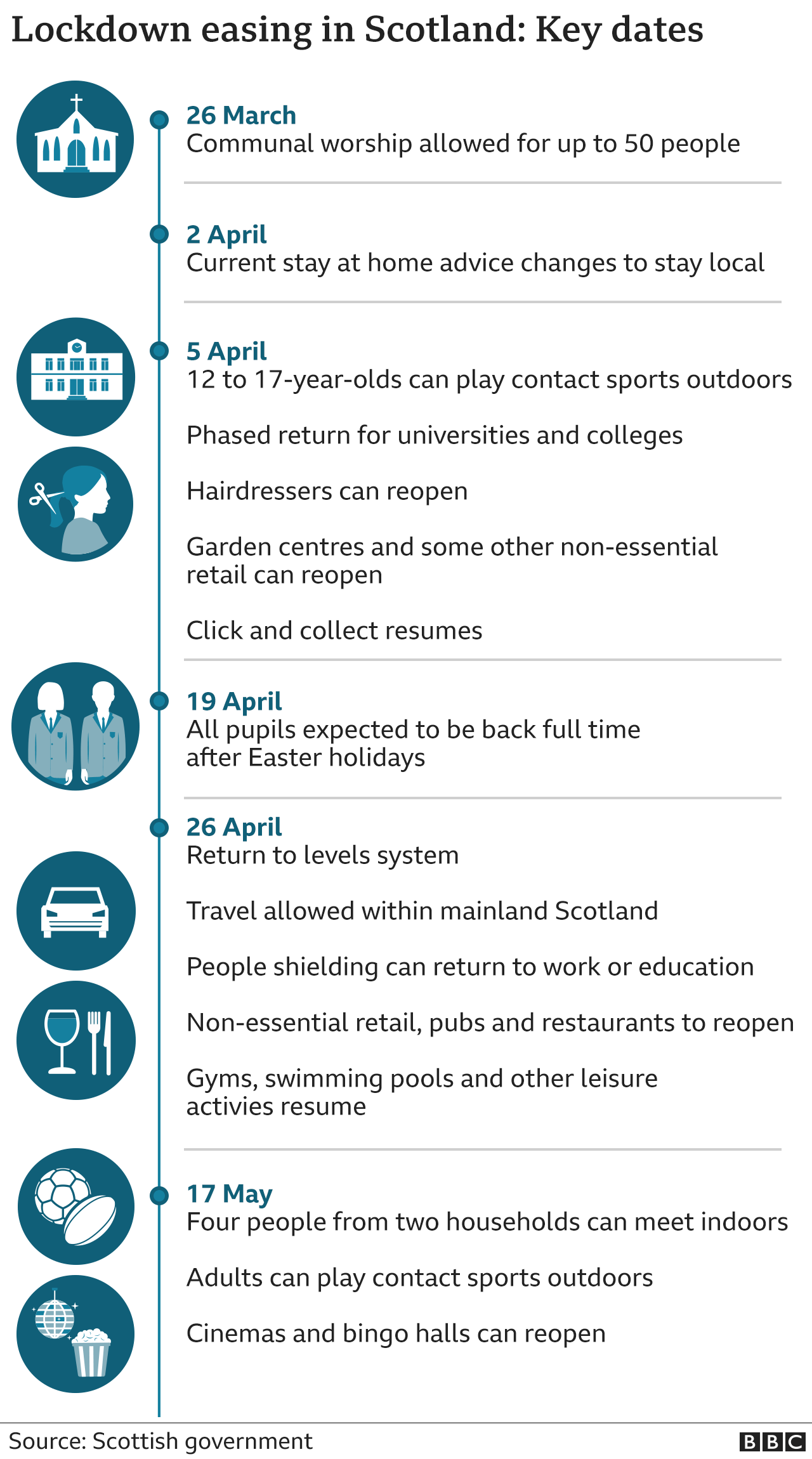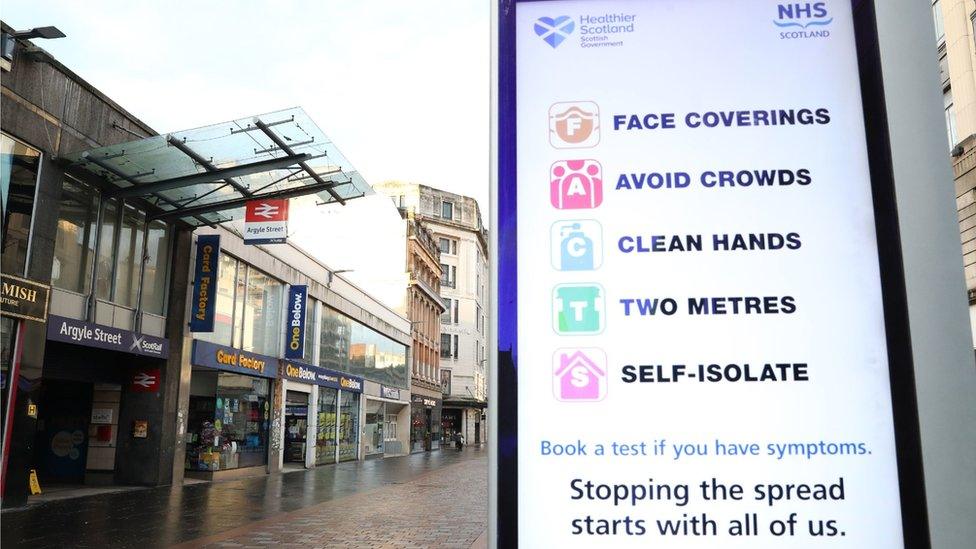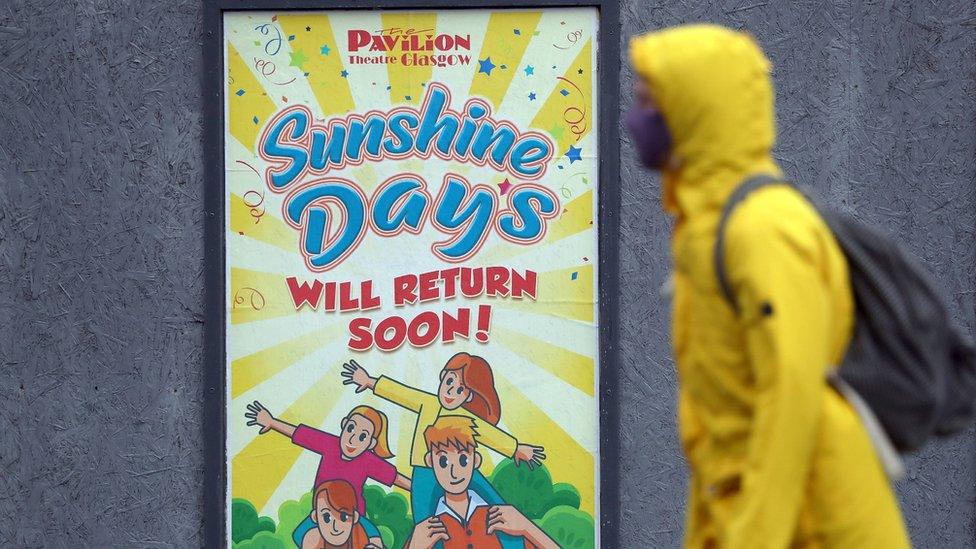Covid in Scotland: Hairdressers to reopen on 5 April as rules ease
- Published
- comments
Hairdressers and garden centres set to open in Scotland
Hairdressers and garden centres will be allowed to reopen in Scotland from 5 April, days after the "stay at home" lockdown order will be lifted.
People will still have to stay inside their own local authority areas until 26 April, when the travel ban will be lifted within Scotland.
That date will also see all shops, gyms and tourist accommodation reopen, as well as some indoor hospitality.
First Minister Nicola Sturgeon said that "brighter days are ahead of us".
The "stay at home" order, which has been in place since December, will be lifted on 2 April - although Ms Sturgeon said people would be encouraged to "stay local" for a further three weeks.
Other changes - including the reopening of hairdressers, click and collect services and homeware shops and the resumption of outdoor contact sports for 12 to 17-year-olds - will be phased in from 5 April.
All children should return to school full-time after the Easter break, which for some will be from 12 April.

Hairdressers can reopen from 5 April
The first minister said the government was on track to hit the target of giving a first dose of vaccine to all priority groups - including "a significant majority of Scotland's adult population" - by mid-April.
She said this would "give us confidence to ease restrictions much more significantly from 26 April".
It is expected that all areas which are under level four restrictions will move down to level three from that date, and that:
restrictions on travel within mainland Scotland will be lifted
gyms will reopen for individual exercise
remaining shops will open, along with tourist accommodation, museums, libraries and galleries
up to six people from three households can meet outside, while under-18s from up to six households are allowed to gather
pubs, cafes and restaurants can open outdoors until 22:00 and can sell alcohol
indoor hospitality can open until 20:00, but alcohol will not be allowed and people must meet in groups of up to four people from two households
work in people's homes can resume, as can driving lessons
up to 50 people can attend weddings and funerals
A decision has not yet been taken on whether people will be allowed to meet indoors from 26 April, with Ms Sturgeon saying the situation would be kept "under ongoing review".
She told MSPs that four people from two households would be allowed to meet indoors from 17 May at the latest.
Other changes from mid-May could include the return of cinemas, amusement arcades and bingo halls, along with adult outdoor contact sports and indoor group exercises.
But Ms Sturgeon said that to come up with precise dates for other changes - like "normal family gatherings where we can hug our loved ones, sporting events, gigs and nightclubs" - would involve "plucking it out of thin air".

However, she said she was "optimistic" that these things could be possible by summer, particularly as the vaccine programme continues.
"This is certainly the most hopeful I have felt about the situation for a long time," she said.
Restrictions on journeys between Scotland and other parts of the UK are likely to be lifted on 26 April, or "as soon as possible thereafter".
However, Ms Sturgeon warned that international travel would not be possible until at least mid-May due to the risk of importing new cases of the virus.
She said that "our view is that it may well not be possible for a further period after that" - and that pre-departure and post-arrival testing would likely remain in place "for some time to come".

Scottish Conservative leader Ruth Davidson said the statement was overdue, but welcome.
However, she said there had been no mention of measures like reopening more court services and certain NHS treatments.
And she called for the reopening of gyms to be brought forward so women in particular can "get out of the house and do basic exercise without fear".
Scottish Labour leader Anas Sarwar said the current lockdown must be the last one, and that the government needed "effective testing and tracing" systems to keep infections low.
He called for more backing for businesses to recover from the pandemic, saying that "transitional support must be available over the longer term to avoid businesses having to close".

Data not dates was to be the key to lockdown easing in Scotland.
The first minister now seems confident enough in the trend in coronavirus suppression data to give indicative dates for when traditional freedoms should be restored.
When Boris Johnson did this a few weeks ago, Nicola Sturgeon was criticised by some for being overly cautious and insufficiently optimistic.
Today, there's caution still - all easing depends on keeping down the virus and keeping up the vaccination programme.
But the first minister said this was the "most hopeful" she had felt for a long time and that "something much closer to actual normality" might be achieved as we move into summer.
The change in tone feels significant and this timetable comes just a week before the first anniversary of the original lockdown.

Open up

Ms Sturgeon said the government had to make "careful, cautious, sensible and sometime unpopular decisions" to make sure the exit from lockdown kept moving "steadily and in one direction".
The final payments of a range of business support grants are due to be paid in March and April, but Ms Sturgeon acknowledged the "need for medium term-support". She said the government had continued rates relief for the worst-hit sectors for the whole of the coming financial year.
Scottish Green MSP Alison Johnstone said the lifting of restrictions was "most welcome for everyone", but voiced a concern about a slight increase in daily cases and called for more testing on university and college campuses.
Ms Sturgeon said that "any time we open up and people start to come together there is greater opportunity for transmission", and that "we need to get all of the pieces of this in balance as much as we can".
Scottish Lib Dem Willie Rennie pressed for more information about the "indicators that will allow people to understand when they will be moving from one level to the next in their area".
The first minister said everything was "predicated on the data going in the right direction", and that "all bets are off" if case numbers rise sharply again.
She told MSPs that her "hope and ambition" was that all of Scotland could be in level one by early June, and then the bottom tier - level zero - from the end of that month.

